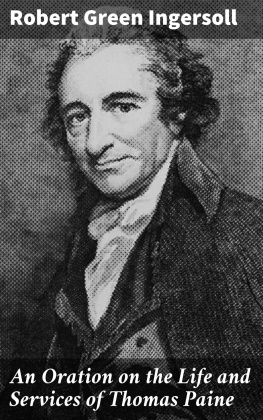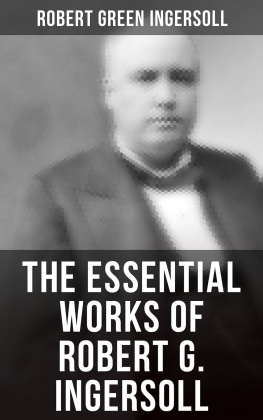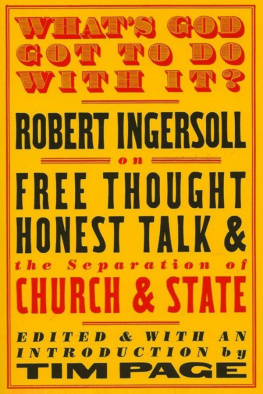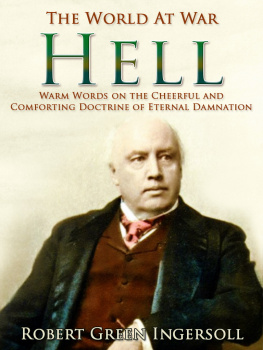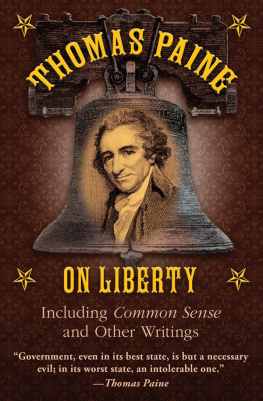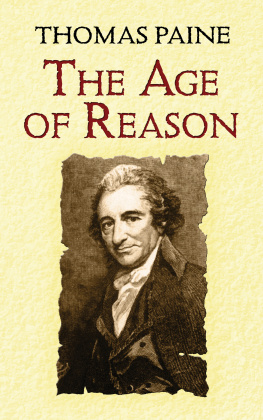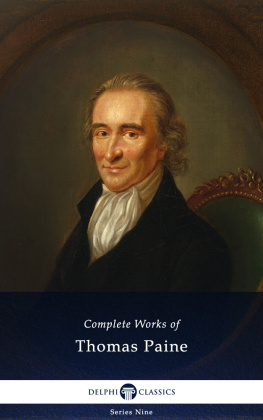THOMAS PAINE
To speak the praises of the brave and thoughtful dead, is to me a labor of gratitude and love.
Through all the centuries gone, the mind of man has been beleaguered by the mailed hosts of superstition. Slowly and painfully has advanced the army of deliverance. Hated by those they wished to rescue, despised by those they were dying to save, these grand soldiers, these immortal deliverers, have fought without thanks, labored without applause, suffered without pity, and they have died execrated and abhorred. For the good of mankind they accepted isolation, poverty, and calumny. They gave up all, sacrificed all, lost all but truth and self-respect.
One of the bravest soldiers in this army was Thomas Paine; and for one, I feel indebted to him for the liberty we are enjoying this day. Born among the poor, where children are burdens; in a country where real liberty was unknown; where the privileges of class were guarded with infinite jealousy, and the rights of the individual trampled beneath the feet of priests and nobles; where to advocate justice was treason; where intellectual freedom was Infidelity, it is wonderful that the idea of true liberty ever entered his brain.
Poverty was his motherNecessity his master.
He had more brains than books; more sense than education; more courage than politeness; more strength than polish. He had no veneration for old mistakesno admiration for ancient lies. He loved the truth for the truth's sake, and for man's sake. He saw oppression on every hand; injustice everywherehypocrisy at the altar, venality on the bench, tyranny on the throne; and with a splendid courage he espoused the cause of the weak against the strongof the enslaved many against the titled few.
In England he was nothing. He belonged to the lower classes. There was no avenue open for him. The people hugged their chains, and the whole power of the government was ready to crush any man who endeavored to strike a blow for the right.
At the age of thirty-seven, Thomas Paine left England for America with the high hope of being instrumental in the establishment of a free government. In his own country he could accomplish nothing. Those two vulturesChurch and Statewere ready to tear in pieces and devour the heart of any one who might deny their divine right to enslave the world.
Upon his arrival in this country, he found himself possessed of a letter of introduction, signed by another Infidel, the illustrious Franklin. This, and his native genius, constituted his entire capital; and he needed no more. He found the colonies clamoring for justice; whining about their grievances; upon their knees at the foot of the throne, imploring that mixture of idiocy and insanity, George the III. by the grace of God, for a restoration of their ancient privileges. They were not endeavoring to become free men, but were trying to soften the heart of their master. They were perfectly willing to make brick Pharaoh would furnish the straw. The colonists wished for, hoped for, and prayed for reconciliation. They did not dream of independence.
Paine gave to the world his "Common Sense." It was the first argument for separation, the first assault upon the British form of government, the first blow for a republic, and it roused our fathers like a trumpet's blast.
He was the first to perceive the destiny of the New World.
No other pamphlet ever published accomplished such wonderful results. It was filled with argument, reason, persuasion, and unanswerable logic. It opened a new world. It filled the present with hope and the future with honor. Everywhere the people responded, and in a few months the Continental Congress declared the colonies free and independent states.
A new nation was born.
It is simple justice to say that Paine did more to cause the Declaration of Independence than any other man. Neither should it be forgotten that his attacks upon Great Britain, were also attacks upon monarchy; and while he convinced the people that the colonies ought to separate from the mother country, he also proved to them that a free government is the best that can be instituted among men.
In my judgment Thomas Paine was the best political writer that ever lived. "What he wrote was pure nature, and his soul and his pen ever went together." Ceremony, pageantry, and all the paraphernalia of power, had no effect upon him. He examined into the why and wherefore of things. He was perfectly radical in his mode of thought. Nothing short of the bed-rock satisfied him. His enthusiasm for what he believed to be right knew no bounds. During all the dark scenes of the Revolution, never for one moment did he despair. Year after year his brave words were ringing through the land, and by the bivouac fires the weary soldiers read the inspiring words of "Common Sense," filled with ideas sharper than their swords, and consecrated themselves anew to the cause of Freedom.
Paine was not content with having aroused the spirit of independence, but he gave every energy of his soul to keep that spirit alive. He was with the army. He shared its defeats, its dangers, and its glory. When the situation became desperate, when gloom settled upon all, he gave them the "Crisis." It was a cloud by day and a pillar of fire by night, leading the way to freedom, honor, and glory. He shouted to them, "These are the times that try men's souls. The summer soldier, and the sunshine patriot, will, in this crisis, shrink from the service of his country; but he that stands it now deserves the love and thanks of man and woman."
To those who wished to put the war off to some future day, with a lofty and touching spirit of self-sacrifice he said: "Every generous parent should say, 'If there must be war let it be in my day that my child may have peace.'" To the cry that Americans were rebels, he replied: "He that rebels against reason is a real rebel; but he that in defence of reason rebels against tyranny has a better title to 'Defender of the Faith' than George the Third."
Some said it was not to the interest of the colonies to be free. Paine answered this by saying, "To know whether it be the interest of the continent to be independent, we need ask only this simple, easy question: 'Is it the interest of a man to be a boy all his life?'" He found many who would listen to nothing, and to them he said, "That to argue with a man who has renounced his reason is like giving medicine to the dead." This sentiment ought to adorn the walls of every orthodox church.
There is a world of political wisdom in this:"England lost her liberty in a long chain of right reasoning from wrong principles;" and there is real discrimination in saying, "The Greeks and Romans were strongly possessed of the spirit of liberty, but not the principles, for at the time that they were determined not to be slaves themselves, they employed their power to enslave the rest of mankind."
In his letter to the British people, in which he tried to convince them that war was not to their interest, occurs the following passage brimful of common sense: "War never can be the interest of a trading nation any more than quarreling can be profitable to a man in business. But to make war with those who trade with us is like setting a bull-dog upon a customer at the shop-door."
The writings of Paine fairly glitter with simple, compact, logical statements, that carry conviction to the dullest and most prejudiced. He had the happiest possible way of putting the case; in asking questions in such a way that they answer themselves, and in stating his premises so clearly that the deduction could not be avoided.

